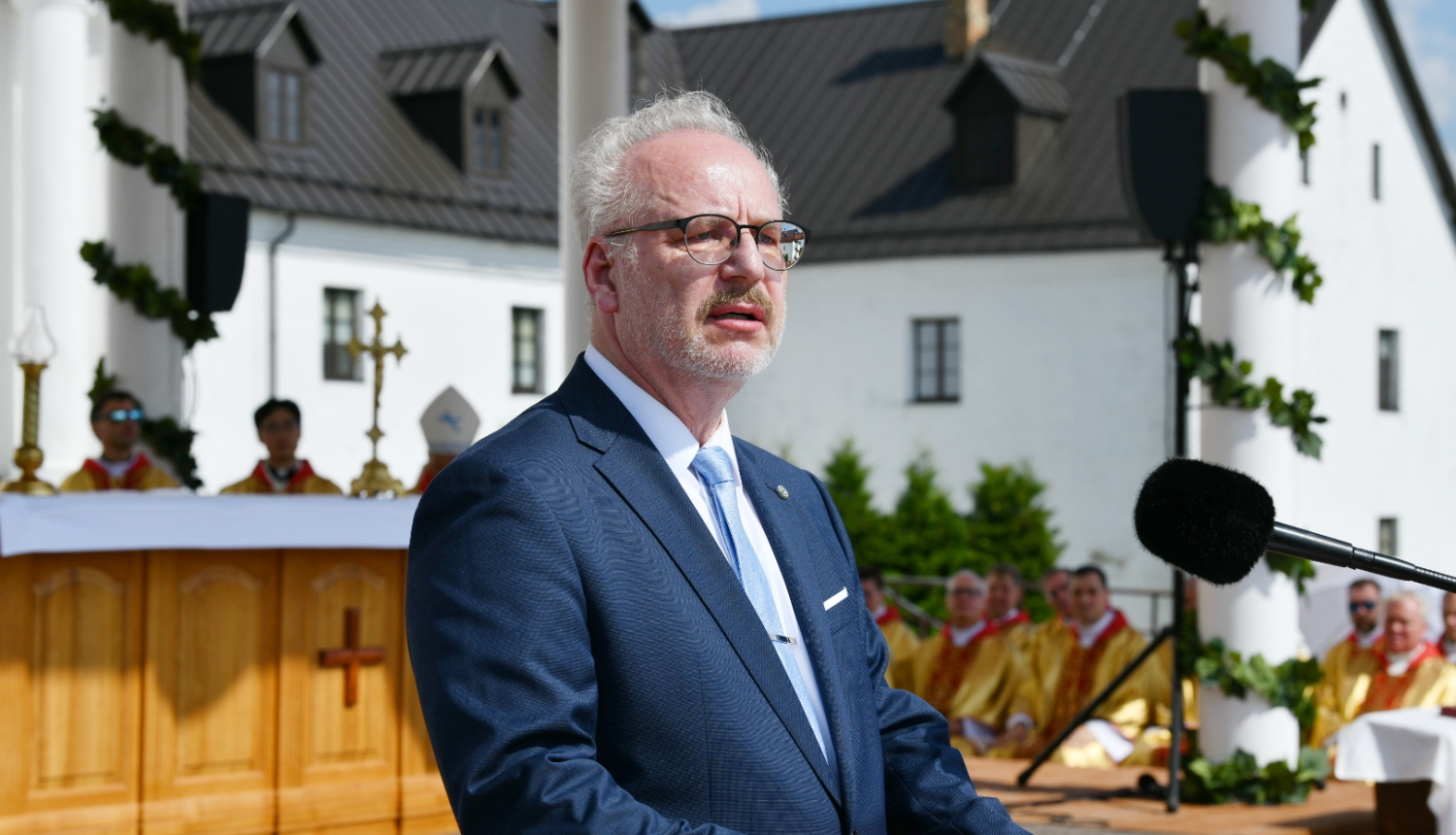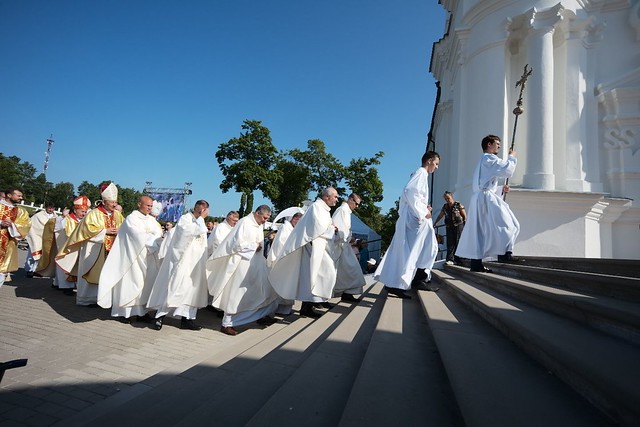Duorgī latgalīši [Dear Latgalians], Aglyunīši [inhabitants of Aglona], Svātceļnīki [pilgrims], Meilī draugi [Dear friends],
I
Maņ ir eistyna prīca byut otkon kūpā ar jiusim Aglyunā.
Sirsneigi sveicīni itymūs skaistajūs i īdvasmojušūs svātkūs!
[It is my great pleasure to join you again here in Aglona.
Big congratulations on this inspiring and beautiful day!]
II
A couple of days ago, 30 years back, one of the symbols of Latgale and whole Latvia, Māra of Latgale, a monument honouring the liberation of Latgale, returned to its spot in Rēzekne.
It rose together with newly independent Latvia.
Sculptors Leons Tomašickis and Kārlis Jansons managed to capture the Latgalian and also Latvian identity, our cultural roots and sense of belonging in Māra of Latgale.
They created the image of Māra of Latgale moving towards us in her folk costume with cross in her raised right hand and her feet stepping on the snake that represents the broken shackles of serfdom and slavery.
The image of Māra of Latgale strongly combines Latvian and Christian traditions.
III
This beautiful sculpture represents our identity and place in the European cultural landscape, Livonian traditions, Latvian folk wisdom and language, European ties, universal human and Christian values described in the Preamble of our constitution, Satversme.
Our identity contains elements of national, Latvian identity and European identity deeply rooted in Christian values. And this connection is especially strong here in Latgale.
You can see Christian values all over Europe’s cultural landscape. We cannot ignore it. No matter how far we sometimes are from religion or church.
IV
Ladies and gentlemen, fellow Latvians,
We have gathered here today in the garden of the Aglona Basilica and the whole event is broadcast live. We have the leaders of the Catholic Church of Latvia and guests. Your celebration is attended by top Latvian officials.
Hence, I feel compelled to say some words about the relationship of religion and a state, the role of church in our social life.
German legal philosopher and constitutional court judge Ernst-Wolfgang Böckenförde once said ‘democratic and secular European countries are based on values they neither create nor can explain’.
Values that drive efficient democracies are deeply rooted in European Christianity and philosophical traditions. Modern democracies and human rights safeguards would not exist without Christian values underpinning them.
These shared values determine the framework of the relationship between church and state.
Article 99 of Satversme says that our state is separate from church. Separation underlines the secular nature of modern democracies. On the other hand, this separation is described in the same article as basic right to freedom of thought, conscience and religion.
We should not interpret this article of Satversme superficially and think that state should ignore religion or 8 traditional confessions listed in the Civil Law, or treat religious organisations like any other non-governmental organisations or entities.
Although, as a secular country, Latvia is expected to be religiously neutral and guarantee religious freedom, it should also respect the values that shape our collective identity as a society.
People, society and the whole state cannot function without clear values. These core values for Latvia are listed in the Preamble of our constitution.
The idea that a democracy cannot create new fundamental values, or it would be difficult to devise them, is based on the understanding that a society, which follows the principles of pluralism, in a modern sense, cannot agree on shared, universal truths.
Modern societies are characterised by great diversity of sometimes conflicting views. It is, however, crucial to also understand that values that were nurtured over centuries solely by church as the only monopoly, continue to be a vital part of secular, modern and democratic countries of today.
That is why Christian heritage is so important for a modern democracy. Just as the Preamble of Satversme says.
V
As we can see, modern democracies do not have to ignore religion. Instead, they should treat centuries-rich religious heritage sustained and supported by church to this day, in the modern age, with respect.
State and religion stand apart. But not in isolation. In mutual respect.
One of the signs of such respect is the participation of top officials in today’s celebration here in Aglona. Religious organisations do the same on national holidays.
Modern times have created many challenges for Christians. How should one live with timeless dogmas of Christianity under modern day hectic pace of life where values are relative, openness and readiness to face the unknown that the future presents is a must? This is also one of the issues addressed by Archbishop Zbigņevs Stankevičs in his recent book ‘Quo vadis, West?’.
And safe and strong church that relies on its identity knows how to face this challenge. It is the way in which religion contributes to the essential elements of modern democratic society, i.e., it provides its own understanding of our shared values.
This means our social processes cannot take place without the participation of progressive religious organisations. Church should promote timeless values. Speak about the connection between earthly life and higher power.
Church has the right to express its legitimate views and reservations about all issues concerning modern society, for example, definition of family, where life starts and where it ends, solidarity between people and other issues of public importance. Church should not be left out of this debate; it would be against Satversme.
Democratic societies have debates before taking decisions. Church does not have any veto rights on what is discussed, but it is still one of the key opinion leaders our society respects to this day. It has the right to inform and defend its position.
Traditional respect and dialogue between religion and state in free Latvia has developed rather naturally, without major conflicts.
This is a valuable and progressive characteristic of Latvia’s democratic tradition.
VI
Fellow Latvians,
Our world changed forever on 24 February. Our hearts and minds are in Ukraine.
Russia has committed unthinkable and inexplicable war crimes against Ukrainians.
I had the opportunity to visit Ukraine this spring and witness myself all the damage inflicted upon Ukrainian cities and people’s lives, the consequences of Russian army’s brutality and wickedness.
It is also clear that everyone who took part in these atrocities will be held liable for these crimes.
Everyone who does not know the line between good and bad, struggling to take the right side, should understand that they are now part of the gang of war criminals and Kremlin’s collaborators.
Let us appreciate the peace in our land. Peace is extremely fragile. It is a true gift that we can all use to make our future better.
VII
Dear friends,
Māra of Latgale reminds us that we are ‘United for Latvia”. United by the same goal and sense of responsibility.
These words encourage us to aspire for more.
Pilgrimage is one of the ways to shake off the everyday rut and rush. As you walk, you can think about things that really matter.
I hope that everyone gathered here in Aglona has gone through own revelations along the way.
I hope you have found inspiration, strength and faith to create.
VIII
I am grateful to all bishops and priests for their prayers and encouragement to continue to focus on what truly matters every day.
Thank you to everyone who helped and organised this wonderful celebration.
Big, big thank you to all pilgrims who prayed and sent their thoughts to Latvia and Ukraine.
IX
Dear people here in the wonderful garden of Aglona Basilica,
We see all generations here: grandmothers and grandfathers, fathers and mothers, grandsons and granddaughters, families and lineages.
I have no doubt that your hearts are pure and your thoughts are just.
You and your families celebrated the Assumption of the Blessed Virgin Mary shortly after Latvia officially regained its independence, and you celebrated it after 1918. This celebration takes place after the restoration of national independence. And in spite of all circumstances, you never stopped celebrating even in Soviet occupation era.
I am deeply impressed by the strength of your faith and how lively it is.
I hope the spiritual energy and reassurance you get here in Aglona will be your best guide to what is right and good in our life.
God Bless Latvia!





